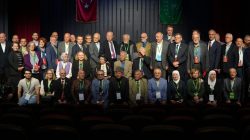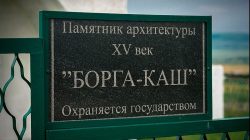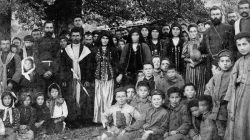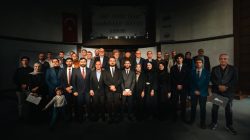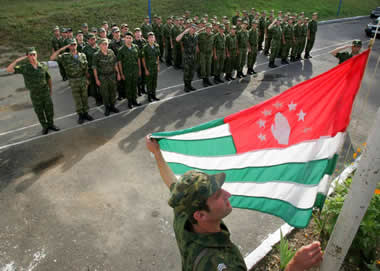
Normal0This is history; nobody ever knows when it brings fortune to somebody on the one hand while it causes damage to somebody else on the other. Since July 2006 when President Mikheil Saakashvili of Georgia was encouraged by the neocons of the Bush administration to order the Georgian troops to be stationed in Kodor Gorge, we have remained fearful that he would attempt anytime to reclaim control over Abkhazia and South Ossetia.
It was on August 7 when he showed signs of madness and waged an all out war to ‘set South Ossetia free’. He even ordered the reservists to be called up… What an air it was! Such were the words that the ‘Little Bush’ spoke across the Caucasus: "We started a military operation to set Tskhinval free. Our forces have gained full control over the whole of South Ossetia." He ordered the Georgian army to bombard with all of its rockets and missiles the Ossetian children, about whom he had worn a sad expression on his face while he had caressed their foreheads and had told a group of Western journalists who had accompanied him in his visit to the village of Kurta a short while ago that he would not let them die, because he preferred a peaceful solution. Saakashvili was just like George W. Bush in that he caused over one million Iraqis to be killed in a war that was launched to set them free!
Saakashvili lost after he gambled horrendously, so did his boss, the United States (US). Russia taught Saakashvili his lesson as its forces intervened to halt the Georgian attacks, plainly targeted on an area under its control, where its peace-keeping forces were entitled by the 1992 armistice to remain stationed, and it did this with even less than one-tenth of the entire damage that Georgia caused when it launched its incursion into the Ossetian territory. And the day has now come—a day that the West has always feared would come: The Russian Federation has recognized today, 26 August 2008, both Abkhazia and South Ossetia as independent countries. The two ‘de facto’ republics in the Caucasus have eventually become ‘de jure’—at least for Russia. That is the moment when history has brought fortune to the Ossetians and Abkhazians alike!
The whole world now looks for answers to questions of how the situation has so worsened and of what will happen afterwards. Let’s first list the facts to not become easy prey for the mass media, which is good at manipulating us into accepting its answer to the question of how the situation has so worsened: After the 11 September 2001 attacks, a ‘loathsome’ alliance was formed between Moscow and Washington to enable the US to use Georgia as a base through which to go to the Caucasus, a region that had remained blocked to the US access since the Cold War era. In its invasions of both Afghanistan and Iraq, the US used Georgia as its headquarters. And Vladimir Putin used this alliance to make Russia’s horrendous acts of mass killing in Chechnya seem to be intended as part of “the fighting against terrorism” after he equated Chechnya’s war of freedom with the US war with the al-Qaeda. International support was discontinued and Chechnya was done away with. However, the US tried putting up a few new barricades through civil uprisings backed up by the financial wizard Soros in such places already under Russia’s influence as Georgia, where ‘the Revolution of Roses’ took place in late 2003, and Ukraine, where ‘the Orange Revolution’ occurred in late 2004. Just after he could remove trouble facing him up in Chechnya, Putin started to intrude into the one-dimensional world of the US as soon as he felt assured to say that he was now a global actor, because the growth of economic power of his country that followed the rise in oil prices helped him to restore the prestige of Russia to that of Soviet Union. While Russia stays deeply silent on the countries that have gone out of their orbits in the wake of colourful revolutions, the US has already pressed the button to install missile defence system in both Czechia and Poland after it used Iran as an excuse to do so. The target was obviously Russia.
The most critical action was taken in Kosovo in February when the Western countries recognized its unilateral declaration of independence from Serbia. The latest move came from a summit in Bucharest in April when the NATO gave Georgia a strong assurance about its future chances of membership.
It was obvious that the US would respond through the Caucasus. But, in fact, Russia wanted to threaten Georgia’s accession to the NATO by recognizing Abkhazia and South Ossetia. It is thanks to ‘the stupidity’ of Saakashvili that Russia played its card earlier than expected.
Let’s make a further note after we firstly remember Russia’s bloody criminal record that went into the history of the Caucasus, secondly the vast Caucasian Exile of 1864 when the Circassians were banished from their homeland, thirdly the series of tragedies that went on from 1943 to 1944 and caused the expulsion to Siberia as well as to the Central Asia of the Chechens, the Ingushes, the Karachays, the Balkars, the Crimean Tatars and the Meskhetians, and lastly, the killings that have totalled 230 000 people in the two wars in Chechnya since 1994: Russia is today right to both thwart the US influence on global issues like Iran and the Middle East and recognize Abkhazia and South Ossetia. Why? Aside from the global issues, if we are allowed to take a position only on the course of events in the Caucasus, we can say that the confounding principle of ‘territorial integrity’ has become fairly apparent in the case of Kosovo that proved to be an idol for the sovereigns to eat whenever they got hungry. Although Moscow warned that Kosovo would set an example for the ‘de facto’ independent countries, it could not stop the Westerners from recognizing Kosovo’s unilateral declaration of independence. Russia was right to argue that it would set an example. It is unfortunate that the West is hypocritical about both the recognition of fundamental rights and the international law about which there is actually a need for a fundamental query because it does not equally apply to everyone. Who can ever forget the Western circle of countries, led by Germany, dividing Yugoslavia into bite-size pieces so as to arouse the homicidal tendencies of Serbia, afterwards watching from the sidelines the murdering of Bosnians, the killing of 8 000 Muslim men in Srebrenitsa due to the betrayal of Dutch troops of the United Nations (UN) peace-keeping forces that chose to wink at what was happening. Kosovo was the most tormenting price that Serbians paid while they got involved more and more in butchery. Perhaps Serbians had long ago deserved it because of what they had done. Would it not be wise, however, to ask those who stick to their guns about ‘the principle of territorial integrity’: “Was Kosovo not the country of the Slav people from the very start? Why was the principle of territorial integrity made a mess of when it came to Serbia?” We sympathize with the Albanians and applaud their struggle for independence when the Muslim identities become part of what we are concerned with. But there is something morally wrong if somebody defends the principle of territorial integrity on the one hand and applauds the separation of Kosovo from Serbia on the other. Regrettably, Turkey tops the list of countries that move along this line of thought; whenever South Ossetia and Abkhazia become a matter of discussion, Turkey feels prompted to express at once ardent support for Georgia’s territorial integrity. What does Turkey say about a UN stipulation that grants peoples the right to decide their fates, after all? Well, it says nothing! But, just as Abkhazia is the country of Abkhazians from the very start, Ossetia is the country of Ossetians from the very start. Will these two countries be Georgian properties simply because Joseph Stalin (1879–1953), Gori-born Soviet statesman of Georgian origin, bestowed them to Georgia in his time? Neither the Abkhazians nor the Ossetians have ever accepted it. And as soon as the Union of Soviet Socialist Republics (USSR) broke up in 1991, both Abkhazia and Ossetia broke with Georgia. But both countries suffered, just as Chechnya did, a failure in being recognized by the international community as former members of the USSR. While Chechnya tried to break away from Russia, it became a lifesaver for the two other Caucasian peoples altogether. (This is a topic to write about in an entirely separate occasion.)
What will then follow all this? It is obvious that calling it simply a cold war does not say everything about the recent developments. All the US could do after its reputation was damaged was to sign a pact with Poland to set up a missile defence system there and to send small warships off to the Black Sea on the pretext of delivering humanitarian aid there. Everybody is looking for an answer to the same question: Will the tactical fighting between the two superpowers of the world turn the Black Sea into a combat zone? The fact is that both countries fought a fifty years of cold war to avoid engaging in a hot war. Neither side can dare to go to a war, unless, of course, some madman shows up. As is well known, the history owes its turning points to madmen. It seems like that the sides will play all of their cards. But, the US does not have much to do in places where the Russian influence is visibly felt. All the attempts that the Bush administration made in the Central Asia to render Russia passive have equally failed. Bush is a lame-duck president well before the November elections. Washington may perhaps finally try playing its Chechnya card to force Russia into a corner. While the two imperialists grapple with each other, it may surprisingly end up with Chechnya being set independent! Americans may also fan the flames of struggle for independence in other Caucasian republics, including Tatarstan. Aside from that, there are many more cards to play outside the Caucasus: Russia may try recognizing Transnistria in its struggle for independence from Moldova, it may choose to detach Crimea from Ukraine, or it may rather provoke the Russian population either in eastern Ukraine or in Estonia, a member of the European Union (EU), where 25 percent of the population consists of Russians. As winter approaches, Russia may rely on its vast sources of natural gas and try teaching the overindulged Western allies of the US how to behave well. And there is no doubt that it will target its missiles at Poland and Czechia as it has already threatened to do so. The West, on the other hand, may impetuously choose to grant Georgia accession to the NATO. It is on the basis of this kind of possibility that Russia signals future plans of using Abkhazia and South Ossetia as military buffer zones. We will soon see Russian bases set up in those two regions. We will even see in the Middle East reflections of the situation as it worsens across the Caucasus. Russia will take Iran under its wing while it remains a target for both the US and Israel, and it will ally itself with Syria—a country that is technically at war with Israel—just as in the former Soviet days. Bashar Assad (1965– ), Syrian president, already talked to Russian officials in Moscow the other week about his plans to buy an air defence system, missiles and airplanes from Russia… And Russia is eager to re-launch its former base in this country. In short, the world will witness, thanks to Abkhazia and South Ossetia, the 21st century version of the battle over how to share the world that was formerly fought in the aftermath of World War II.
Today, the Caucasus enjoys the happiness of Abkhazia and South Ossetia being formally recognized by Russia. However, the fact remains that Russia will not just stay ‘a guarantor of peace’—a status that it has fully achieved after it intervened in the war which Georgia, the ‘little imperialist’ of the Caucasus which became a tiny, powerless country after several Caucasian peoples were left subjected to its brutal acts of violence for 300 years, launched against South Ossetia in August this year. Doubtlessly, both Abkhazians and Ossetians will have to be more careful in their relations with Russia. But, without a doubt, Abkhazians will have to be far more careful in their relations with Russia. It is left to the Abkhazians to prove the Georgian administration wrong in its argument that “Russia is annexing, not recognizing, Abkhazia” because they were able to elect in 2005 Sergei Bagapsh president instead of Raul Hajimba whom Putin secretly supported. And time will tell whether or not South Ossetia—a country that considers joining North Ossetia—will be just as able as Abkhazia is.
31 August 2008
Fehim Taştekin




